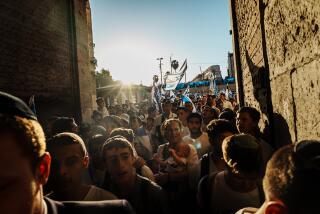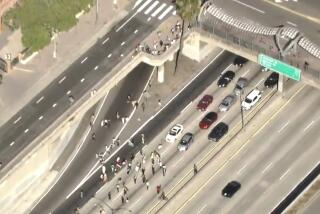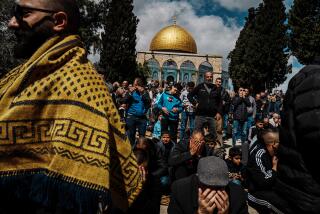Police Thwart Arafat Call to Mass Prayer
- Share via
JERUSALEM — Israel used roadblocks and a heavy police presence Friday to frustrate Yasser Arafat’s call for a mass prayer demonstration at Jerusalem’s Al Aqsa Mosque.
Palestinians had predicted that more than 100,000 people would respond to the call by the Palestinian Authority president, intended to underline claims to the eastern portion of Jerusalem and to protest recent Israeli actions, including a slowdown in the peace process.
But fewer than 8,000 people--about one-third the normal Friday turnout--managed to reach the mosque inside Jerusalem’s walled Old City, according to several worshipers and a guard at the main entrance. Inside the cavernous mosque, one of the holiest sites of Islam, many places were empty.
“This has proved our main argument that Palestinians have no freedom of religion and no freedom to reach the city itself,” said Faisal Husseini, who is a member of the Palestine Liberation Organization’s Executive Committee and is responsible for Palestinian policy in Jerusalem. “They have no right to keep our people from reaching their own city.”
But hard-line members of the Israeli parliament said the low turnout illustrated Arafat’s diminished hold on the Palestinian leadership. “The small numbers . . . show that Arafat has lost his influence over the Palestinians,” Rehavam Zeevi, the leader of the ultra-right Moledet Party, said in an interview with Israel Radio.
The government of Israeli Prime Minister Benjamin Netanyahu has angered Palestinians with several recent actions, including its decision to allow the expansion of Jewish settlements in the West Bank and its failure to resume substantive peace talks.
Palestinians observed a four-hour general strike Thursday, shutting shops and restaurants in the first such work stoppage in more than two years. Arafat then called on Palestinian Muslims to attend prayers at the mosque Friday in defiance of Israeli restrictions on most Palestinians.
Under a closure imposed after a series of suicide bombings in February and March, most Palestinians from the West Bank and Gaza Strip have been barred from entering Israel proper, including Jerusalem. But security was even tighter Friday, with dozens of new roadblocks set up to turn away would-be worshipers well before they reached Jerusalem.
The troops barred entrance to the city not only to West Bank Palestinians but to many carrying documents that identified them as residents of Jerusalem.
But some managed to slip through, climbing over walls and making their way through unblocked alleys to reach the city. A few others, even without permits, said Israeli soldiers let them pass, apparently in deference to their age and evident desire to attend prayers.
“I’m an old man, so they let me through,” said a man of about 60 from Abu Dis, just east of Jerusalem. “I don’t have a permit, but they let me pass.”
*
At one point Friday morning, several carloads were turned back at the Ar Ram checkpoint north of Jerusalem. The passengers, in view of the soldiers, walked a few hundred yards away, clambered over a low concrete wall and walked down a hill to a main road where they got taxis to Jerusalem.
A soldier at the checkpoint acknowledged that some Palestinians were bypassing the roadblock. “Yes, they go over the fence, but I am not going to chase them around,” he said. “I have orders not to let them pass through this checkpoint.”
Along with the troops, about 2,000 Israeli police were deployed in the Old City and throughout eastern Jerusalem during noon prayers. Police on horseback waited just outside the Damascus Gate.
“It’s a big mistake for them to stand here, because it’s like they’re preparing for war,” said Badawi Sanduqa, 24, a Jerusalem laborer who gestured toward the mounted police. “Why are they trying to provoke us?”
Sanduqa accused Israel, through its army and police, of trying to turn the Friday prayer session into a political confrontation but then conceded that Arafat himself had done so with his request to Muslims to hold the protest prayers. “But Israel is making it more of a political thing, with all the police,” he said.
Summer Assad of The Times’ Jerusalem Bureau contributed to this report.
More to Read
Sign up for Essential California
The most important California stories and recommendations in your inbox every morning.
You may occasionally receive promotional content from the Los Angeles Times.










